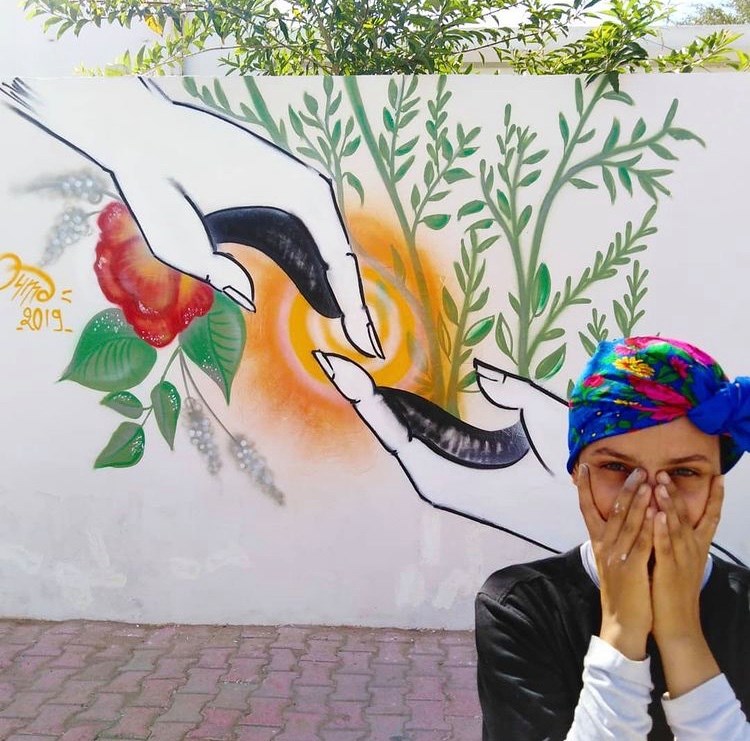
Ouma is a Tunisian street artist and sells artistic products through OumaStore. She attended art school in Sfax and pursued graffiti to show the world her mad skills. Check out our interview with her!
Under Ben Ali, street art could only be done by football fans showcasing their favorite teams. During the revolution, artists used tags on walls to express their political opinions. That is why you’ll find many tags from 2011-2012 that are about politics. After the revolution, graffiti artists came together and organizations began sponsoring street artists, such as OpenArt. The graffiti festival started in 2012 and invited artists from Tunisia, France, and other countries. But it was not only street artists that grew after the revolution. After getting our freedom, all Tunisian artists exploded in the first five years and now, we are the living history of that era. It has been 10 years since I started graffiti and today, myself & other artists are creating what future generations will build upon. Yet, my generation of artists haven’t sat back to acknowledge that we are creating our history. It is amazing for me to be a part of this.
My experiences differ based on the environment I am in. When I started participating in Hip Hop dance battles, the dancers would look at me weirdly since I wear a hijab. Once they learned that I am a graffiti artist, they would think I am doing it as a trend, but people don’t realize that I grew up in a neighborhood where street art was present & I learned to breakdance when I was little.
Another example was when I was spray painting with artists in Paris on a street located between an Arab and tourist neighborhood. The tourists admired the wall I was painting, but the Arabs couldn’t believe that I was wearing a hijab and spray painting. This is largely due to Arabs associating graffiti with criminal behavior. Later on, I went to a bar in the Arab neighborhood and the security guard saw the spray paint bottles. My friend explained to him that I am a street artist and he started telling me that I couldn’t do street art. It is interesting because I have experienced more extreme reactions in France than I have in Tunisia for being a street artist.
I have never felt discomforted by these reactions because I know that me wearing a hijab while spray painting shocks most people, but that is why I do it! In fact, all the art disciplines I am involved in are always surprised. Personally, I never had an artist role model growing up that I could relate to since many Tunisian female artists don’t wear the hijab. So, I want to be a role model for hijabi women & girls to show that they can be artists too.
FEEL IS YOUR PERSONAL RESPONSIBILITY AS AN ARTIST? Being an artist can be a passion for yourself, but I feel that it is also a commitment for me to cover certain topics for my people and my country. Once I became more known, media platforms started reaching out to me and I felt that I had a responsibility for representing female artists and encouraging young girls. When I attend events, girls will share their personal stories or when I am spray painting, citizens will ask me for help. The topics that I mostly engage in are social, environmental, and female empowerment topics. I prefer focusing on these issues rather than political issues because as an artist, I feel that I can represent people more than politics.